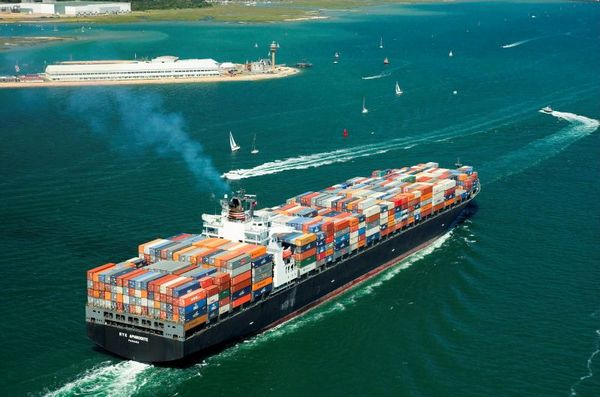An environmental NGO said that container lines calling for urgent action on market-based measures (MBM) from world leaders and the International Maritime Organization (IMO) are attempting to slow the introduction of the EU Emissions Trading System (EU ETS).

Faig Abbasov, Director, Shipping at NGO Transport & Environment, told Container News does not believe that the lines have made a U-turn on MBMs, but he believes that the European lines are trying to head off the challenge posed by the EU Emissions Trading System (EU ETS) or at least delay its introduction.
He said that the container shipping lines are changing strategy demanding action from the IMO knowing that this will not be an easy process, “it’s not likely to happen quickly,” said Abbasov.
With the EU the system is structured and not open-ended, explained Abbsov, “we know by June when the EU ETS will be introduced, but the lines want to slow the process.”
According to Abbasov the plan, most likely spearheaded by European container shipping lines, sees the EU ETS as a major threat and they would like to limit its application to the intra-Europe trades, explained Abbasov, “if they can limit the scope they may be able to get an exemption for themselves,” he added.
However, Abbasov believes that vessel operators outside of the EU have already accepted that the EU ETS will happen and are only arguing for the system to fair, in this sense the container lines will “find themselves in a minority,” said Abbasov.
Abbasov’s comments come as the US announces its intentions to increase its targets for cutting GHG emissions by half along with UK proposals to include shipping in its calculations has put decarbonisation top of the global agenda. Four maritime bodies issued a joint statement on 21 April calling for MBMs to be looked at as a matter of urgency.
Meanwhile, The Washington Post reported yesterday that President Biden will pledge to cut GHG emissions by 50% by 2030, while the UK’s Prime Minister is expected to raise its GHG emission cuts to 78% and to include shipping and aviation in the calculations.
The shift in emphasis, by the UK and particularly from the US, which the Post has said has nearly doubled the original targets set Barack Obama at the Paris meeting in 2015, which set targets of up to 28% of 2005 emissions, is an indication that those outside of the maritime sector are ramping up efforts to cut emissions, particularly with the delayed COP26 meeting looming on the horizon.
As the political manoeuvring for COP26, due to take place in Glasgow later this year, continues the maritime sector has been prompted to emphasise its climate ambitions.
In a joint statement BIMCO, Cruise Lines International Association, the International Chamber of Shipping and the World Shipping Council have urged world leaders “to quickly commence deliberations on how mandatory market-based measures (MBMs) could be implemented for international shipping.”
The four industry bodies, which together represent the vast majority of the global maritime sector, have approached the IMO to bring forward discussions on market-based measures that will help to balance the costs of more expensive low carbon fuels against cheaper fossil fuels.
The joint statement said, “Industry is asking governments to bring discussions on carbon pricing forward so that they can be considered in tandem with proposals to create a US$5billion R&D Fund.”
The statement from the maritime bodies comes as President Biden hosts a two-day climate summit with 40 world leaders, starting today.
Biden’s climate summit is, “Seen as a vital precursor to COP26 and the IMO’s Marine Environment Protection Committee (MEPC), shipping bodies want leaders to put their political weight behind the industry’s desire to eliminate the 2% of all global CO2 that the sector emits.”
As a result the four organisations along with other industry groups, submitted a proposal calling for the IMO “to bring forward discussions around MBMs by several years.”
Maritime, believes that MBMs will put a price on carbon and provide an incentive for the industry to reduce its emissions, “These measures will be critical to incentivise the transition of the global fleet to new fuels and technologies, which will be more expensive than those in use today.”
“For a pricing signal to work, there must be viable alternatives to fossil fuels. These alternatives do not yet exist for large trans-oceanic ships. Development of alternative technologies would be enabled by a massive acceleration of IMO co-ordinated R&D – to be financed by the industry – so that ocean-going ships will be able to switch to new fuels. To this end member states and industry have already put forward a mature proposal to create a US$5 billion fund to provide the research and development needed to create the technologies to decarbonise the sector. Industry leaders have also reiterated their call for nations to support this R&D proposal at the IMO.”
 Hotline: 0944 284 082
Hotline: 0944 284 082
 Email:
Email: 


 VN
VN